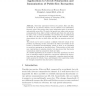Free Online Productivity Tools
i2Speak
i2Symbol
i2OCR
iTex2Img
iWeb2Print
iWeb2Shot
i2Type
iPdf2Split
iPdf2Merge
i2Bopomofo
i2Arabic
i2Style
i2Image
i2PDF
iLatex2Rtf
Sci2ools
CRYPTO
2005
Springer
2005
Springer
One-Way Secret-Key Agreement and Applications to Circuit Polarization and Immunization of Public-Key Encryption
Secret-key agreement between two parties Alice and Bob, connected by an insecure channel, can be realized in an informationtheoretic sense if the parties share many independent pairs of correlated and partially secure bits. We study the special case where only one-way communication from Alice to Bob is allowed and where, for each of the bit pairs, with a certain probability, the adversary has no information on Alice’s bit. We give an expression which, for this situation, exactly characterizes the rate at which Alice and Bob can generate secret key bits. This result can be used to analyze a slightly restricted variant of the problem of polarizing circuits, introduced by Sahai and Vadhan in the context of statistical zero-knowledge, which we show to be equivalent to secret-key agreement as described above. This provides us both with new constructions to polarize circuits, but also proves that the known constructions work for parameters which are tight. As a further application of our r...
| Added | 26 Jun 2010 |
| Updated | 26 Jun 2010 |
| Type | Conference |
| Year | 2005 |
| Where | CRYPTO |
| Authors | Thomas Holenstein, Renato Renner |
Comments (0)

